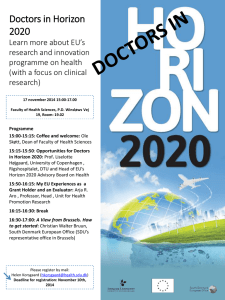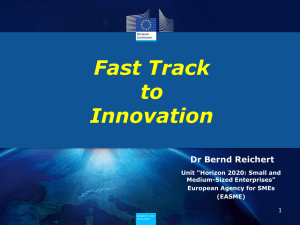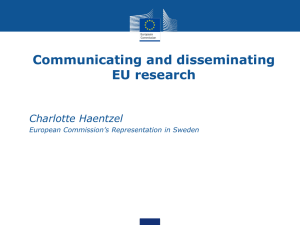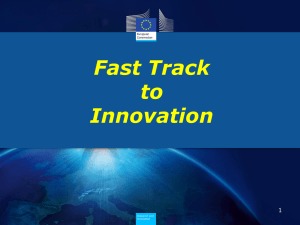NUI nZEB Retrofit Symposium
advertisement
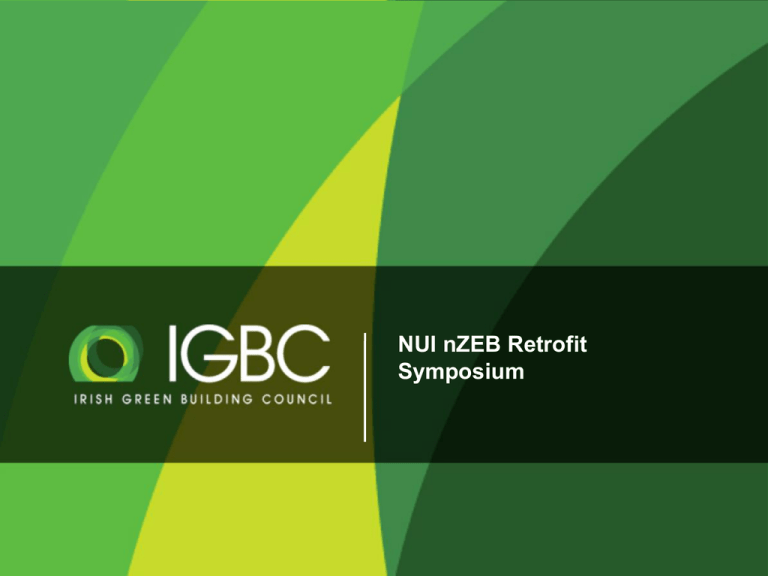
NUI nZEB Retrofit Symposium Three Current Projects Energy Efficiency Directive – Article 4 Member States shall establish a long-term strategy for mobilising investment in the renovation of the national stock of residential and commercial buildings, public and private. Encompassing; (a) (b) (c) Overview of the national building stock; Identification of cost-effective approaches to renovations; Policies and measures to stimulate cost-effective deep renovations of buildings; – Strategy shall be published by 30 April 2014 – 2nd version to be submitted by 30th This project has received funding from the European Union’s Horizon 2020 research and innovation programme under grant agreement No 649727. April 2017 The multiple benefits of energy efficiency The Multiple Benefits of Energy Efficiency – IEA - 2014 World GBC Campaign 2013/14- Article 4 http://www.worldgbc.org/regions/europe/policy Version 1 - Workshops – Dublin Castle - 2014 • The Challenge to achieve a 80% reduction in carbon emissions from all our building stock by 2050 • IGBC led workshop on the version 1 renovation workshop jointly with NESC and DCENR • Three sectors /Public /Residential/Commercial Horizon 2020 funding to help develop Version 2 This project has received funding from the European Union’s Horizon 2020 research and innovation programme under grant agreement No 649727. This project has received funding from the European Union’s Horizon 2020 research and innovation programme under grant agreement No 649727. A - Stakeholder system • All key organisations need to be at the table during this process. • Detailed stakeholder systems maps will be produced for each project country to show precisely which organisations need to be partnering effectively to deliver a bolder vision for building renovation in Europe. • These systems will be tracked throughout the project, looking at how they collaborate and conflict. This project has received funding from the European Union’s Horizon 2020 research and innovation programme under grant agreement No 649727. Mapping stakeholders This project has received funding from the European Union’s Horizon 2020 research and innovation programme under grant agreement No 649727. INFLUENCE: “the relative potential of stakeholders to influence positive outcomes for the national renovation strategies” ALIGNMENT 3 0 = least 3 = most Given deep renovation is not happening at scale, which categories would you expect to contain the highest concentration of stakeholders? 1 2 0 ALIGNMENT 0 = least 3 = most The ‘Unusual Suspects’ hold part of the key? WE DON’T NEED TO THINK OUTSIDE THE BOX: WE NEED TO COMPLETELY REDEFINE ITS BOUNDARIES Who are some of the organisations we can engage with the national renovation strategy challenge, who might have transformative potential if aligned with it, but who are currently completely outside the conversation? Which are the organisations who don’t identify energy efficient building renovation as potentially central to their own objectives, but have objectives that could be supported directly or indirectly by energy efficient building renovation? TRACKING SYSTEM CHANGE OVER TIME ARE WE CREATING THE IMPACT WE NEED TO SHIFT THE SYSTEM? B - Renowiki – Make policy easy for participants • Clarify what is already there. • Stop participants wasting time reinventing the wheel • Allows them to navigate through policy, financial, upskilling and behavioural change initiatives in 14 different countries • Designed for busy professionals not policy wonks! • Regularly updated by our community of experts This project has received funding from the European Union’s Horizon 2020 research and innovation programme under grant agreement No 649727. C - Identifying best practice expertise • bring experts involved with best practice European renovation initiatives identified by the RenoWiki to their countries • To work out how can these initiatives be replicated or adapted to overcome market barriers. Image courtesy of Prof. Ronald Rovers presentation - the Green Room D - Shaping the process • work closely with governments and stakeholders to design a series of national and local events across major cities in the second year of the project, to engage on key issues for the strategies. • The process will be designed for 100% collaborative working and problem solving to ensure the full range of stakeholder expertise is actively utilised. E - The Community process • a total of 88 project stakeholder workshops / conferences at national and European level. • reporting from these events will feed directly into the v2.0 national renovation strategy process and will track how effectively the stakeholder system is collaborating. This project has received funding from the European Union’s Horizon 2020 research and innovation programme under grant agreement No 649727. F -Creating an Innovation incubator Develop on-going work at national level, to create project concepts in the four following fields 1. 2. 3. 4. This project has received funding from the European Union’s Horizon 2020 research and innovation programme under grant agreement No 649727. financial innovation; business model innovation; public sector innovation; behavioural innovation.
